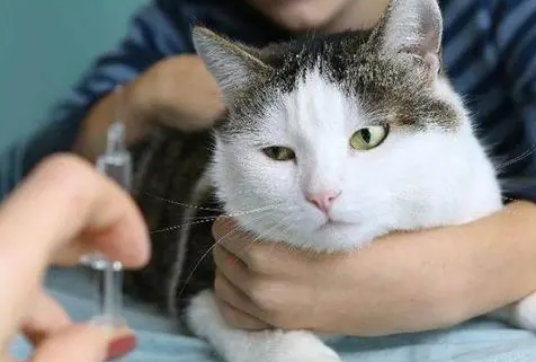中文摘要
猫杯状病毒感染是由猫杯状病毒(FCV)所引起的一种病毒性传染病,临床表现为发热、口腔溃疡、打喷嚏、眼鼻分泌物、结膜炎等。猫杯状病毒在世界范围内流行,多发于猫聚集的场所。目前没有针对猫杯状病毒感染的特异性药物,且国内没有理想的疫苗。临床上普遍应用干扰素和抗生素进行治疗,但治疗效果不理想。而现代药理学研究证明,中药具有良好的抗菌、抗病毒作用。青黛散,首见于武之望《济阳纲目》,由青黛、黄连、黄柏、薄荷、桔梗、儿茶组成,具有清热解毒、宣肺止咳、收敛生肌的功效。目前应用青黛散治疗猫杯状病毒感染的治疗效果未见报道,因此,本实验建立了一个稳定的猫杯状病毒感染模型,探究青黛散加减对猫杯状病毒感染的治疗效果,为临床上治疗猫杯状病毒感染提供新的方法。
通过滴鼻方式以109.67TCID50/m L的1 m LFCV病毒液接种于6-12月龄猫,建立了稳定的猫杯状病毒感染模型。攻毒后48 h,实验猫出现发热、咳嗽等临床症状,扁桃体和肺部产生病理变化。
成功建立猫杯状病毒感染模型后,对青黛散有效剂量进行筛选。设定三个不同剂量青黛散治疗组,分别为高剂量(2 g/kg)治疗组(n=4),中剂量(1 g/kg)治疗组(n=4)和低剂量(0.5 g/kg)治疗组(n=4)。将临床症状评分、体温变化、体重变化、剖检及组织病理变化等作为治疗效果判定指标。结果表明,青黛散各剂量组对猫杯状病毒感染都有不同程度的治疗效果。其中青黛散中剂量(1 g/kg)治疗组的效果最好,能够显着减轻临床症状和扁桃体病理变化。对各组实验猫进行炎性细胞因子表达水平的测定,结果表明猫感染FCV后,IL-6表达显着升高;治疗后,青黛散中剂量(1 g/kg)治疗组的IL-1β和IFN-γ表达显着上升。
最后收集了8例临床病例,在上述实验的基础上,选用1 g/kg青黛散进行治疗。在临床治疗中,青黛散有良好的治疗效果,有效率可达87.5%。结果表明,青黛散有潜力成为临床上治疗猫杯状病毒感染的药物。
关键词 : 猫杯状病毒感染;青黛散;治疗效果。
Abstract
Feline calicivirus infection is a viral infectious disease caused by feline calicivirus (FCV).
The clinical manifestations are fever, oral ulcers, sneezing, eye and nose secretions, conjunctivitisand so on. Feline calicivirus is prevalent worldwide, mostly in places where cats gather. At present,there is no specific medicine for feline calicivirus infection, and there is no ideal vaccine in China.
Interferon and antibiotics are commonly used in clinical treatment, but the therapeutic effect is notideal. Modern pharmacological studies have proved that Chinese medicine has good antibacterialand antiviral effects. Indigo Naturalis Powder, first seen in Wuzhiwang's "Jiyang Compendium", iscomposed of Indigo Naturalis, Coptis, Cork, Peppermint, Platycodon grandiflorum, and catechu. Ithas the effects of clearing away heat and detoxifying, relieving lungs and relieving cough,eliminating phlegm and pus, and astringent muscle growth. At present, there is no report on thetherapeutic effect of Qingdai powder in the treatment of cat calicivirus infection. Therefore, thisexperiment established a stable feline calicivirus infection model to explore the therapeutic effectof Qingdai powder on cat calicivirus infection. Provide a new method for the treatment of catcalicivirus infection.
A stable feline calicivirus infection model was established by inoculating cats aged 6-12months with 1 m L FCV virus solution of 109.67TCID50/m L by nasal drops.48 hours after infection,the experimental cat will have clinical symptoms such as fever, and pathological changes in thetonsils and lungs.
After successfully establishing the feline calicivirus infection model, the effective dose ofQingdai powder was screened. Set three different doses of Qingdai powder treatment groups,namely high-dose (2 g/kg) treatment group(n=4), middle-dose (1 g/kg) treatment group(n=4) andlow-dose (0.5 g/kg) treatment group(n=4). The clinical symptom score,body temperature,bodyweight,necropsy and histopathological changes were used as indicators of treatment effect. Theresults show that the various dose groups of Qingdai powder have varying degrees of therapeuticeffect on cat calicivirus infection. The middle dose group of Qingdai powder(1 g/kg) treatmenthad the best therapeutic effect, which could significantly reduce clinical symptoms andpathological changes of tonsils. The expression levels of IL-1β, IL-6 and IFN-γ were measured forthe blank control group, model group, Qingdai powder high, medium and low dose groups andmodel group. The results showed that IL-6 increased significantly after the cat was infected withFCV After treatment, the IL-1β and IFN-γ in the middle-dose (1 g/kg) treatment group of Qingdaipowder increased significantly.

Finally, 8 clinical cases were collected, and on the basis of the above experiments, 1 g/kgQingdai powder was used for treatment. In clinical treatment, Qingdai powder has a good therapeutic effect, and the effective rate can reach 87.5%. The results show that Qingdai powderhas the potential to become a clinical drug for treating cat calicivirus infections.
Keywords : Feline calicivirus infection; Qingdai powder; Therapeutic effect 。
前 言
猫杯状病毒感染是猫的常见病,猫杯状病毒在世界范围内流行,在猫聚集环境中发生率最高。猫杯状病毒感染的特点是口炎和上呼吸道症状,在临床上猫的慢性口炎、上呼吸道疾病中检出阳性率高。患病猫在急性感染期可随分泌物和排泄物排出大量病毒,直接传染易感猫。而感染猫杯状病毒的猫,在治愈后,依然会长期排毒或终身排毒。猫杯状病毒是威胁猫科动物健康的重要病原体之一。
目前对猫杯状病毒感染没有有效的特定治疗药物,普遍应用干扰素和抗生素。干扰素和抗生素只能起到广谱抗病毒、抗菌作用,对猫杯状病毒感染的治愈效果差。而国内没有猫杯状病毒的理想疫苗。常见的猫用疫苗虽然针对猫杯状病毒,但并不能对猫杯状病毒感染产生良好的预防效果,前人研究表明接种疫苗的猫与猫杯状病毒接触有一半以上的概率被感染。
青黛散,由青黛、黄连、黄柏、薄荷、桔梗、儿茶组成,来源于《济阳纲目》,主治口炎。已有青黛散被用于治疗犬、猫口炎的记载,取得了良好的疗效。而猫杯状病毒感染也会导致猫口炎的发生,因此,选用青黛散加减来治疗猫杯状病毒感染。由于目前尚未有应用青黛散来治疗病毒性传染病的案例,故在本研究中探究青黛散加减对猫杯状病毒感染的治疗效果,旨在为临床上治疗猫杯状病毒感染提供一个新的方法。
【由于本篇文章为硕士论文,如需全文请点击底部下载全文链接】
第一篇 文献综
1、猫杯状病毒感染.
1.1 、病原研究.
1.2、流行病学.
1.3、发病 机制.
1.4、临床 分型.
1.5、猫杯状病毒感染的防治.
2、猫杯状病毒感染模型的研究
2.1、实验 动物的选择.
2.2、毒 株的选择.
2.3、攻毒途径.
3、中药治疗猫杯状病毒感染的现状.
3.1、青黛散的概述.
3.2、中草药提取物对猫杯状病毒感染的抑制作用.
3.3、青 黛散加减中主要单味药的研究概况.
4、小结.
第二篇 研究内容.
第一章 猫杯状病毒 感染模型的建立.
1、材料.
1.1、实验 动物.
1.2、细胞及病毒.
1.3 、主要仪
1.4 、主要试剂.
2、方法
2.1、 细胞复
2.2、细胞传代.
2.3、细胞冻存.
2.4、病毒培养.
2.5、病毒TCID50测定
2.6、模 型建
2.7、 qPCR 鉴定
2.8、数 据统计分析.
3、结果.
3.1、 F81细胞及FCV病毒的培养
3.2 、FCV 的TCIDs0测定结果
3.3、猫杯状病毒感染模型的建立
3.4、PCR结果
4、讨论.
5、小结.
第二章 青黛散加减对猫杯状病毒感染有效剂量的筛.
1、材料.
1.1、试验 动物.
1.2、毒株来源.
1.3、试验药物.
1.4、 主要仪.
1.5、 主要试剂.
2、方法.
2.1、 青黛散的制备
2.2、青黛散有效剂量的筛选,
2.3、炎性细胞因子检测
3、结果.
3.1、临床 症状.
3.2、青黛散的有效剂量筛选试验疗效分析.
3.3、剖检变化.
3.4、组织病理学变化.
3.5、血常规检测结果统计分析.
3.6、炎 性细胞因子变化.
4、讨论
5、小结.
第三章 青黛散加减对 猫杯状病毒感染的临床病例治疗.
1、材料.
1.1、试验 动物.
1.2、试验药物.
1.3、试验材料.
1.4、 实验器材.
2、方 法
2.1、临床 症状变化.
2.2、体温变化.
2.3、体重变化.
2.4、白细 胞数值变化.
2.5、统计分析.
3、结果.
3.1、眼观治疗效果
3.2、临床 症状评分
3.3、青黛散应用疗效分析.
3.4、体温变化.
3.5、体重 变化.
3.6、白细胞数值变
4、讨论.
5、小结.
结论
1. 通过滴鼻的方式,以病毒滴度为109.67TCID50/m L的1 m L FCV病毒液接种于6~12月龄猫,可以建立稳定的猫杯状病毒感染模型。
2. 青黛散高剂量(2 g/kg)、中剂量(1 g/kg)、低剂量(0.5 g/kg)组对猫杯状病毒感染都有不同程度的治疗效果。其中以1 g/kg青黛散治疗组的治疗效果最好。
3. 1 g/kg 青黛散加减应用于猫杯状病毒感染的临床病例中,有良好的治疗效果,治愈率达到37.5%,有效率高达87.5%。
参考文献
[1] SosnovtsevS V , Garfield M,Green K Y . Process ing Map and Essential Cleavage Sites ofthe Nonstructural Polyprotein Encoded by ORF1 of the Feline Calicivirus Genome[J]. J.Virol 2002, 76(14):7060-7072.
[2] Sosnovtseva S A, SosnovtsevS V , Green K Y . Mapping of the Feline Calicivirus ProteinaseResponsible for Autocatalytic Processing of the Nonstructural Polyprotein andIdentification of a Stable Proteinase-Polymerase Precurs or Protein[J]. journal of virology,1999, 73(8):6626.
[3] Sosnovtsev S V,Sosnovtseva S A,Green K Y . Cleavage of the Feline CalicivirusCapsid Prec ursor Is Mediated by a Virus -Encoded Proteinase[J]. Journal of Virology, 1998,70(4):3051-3059.
[4] Di Martino, B, & Marsilio, F. Fe line calicivirus VP2 is involved in the self -assembly of thecapsid protein into virus -like particles[J]. Research in Veterinary Science, 2010,89(2):279-281.
[5] SosnovtsevSV,BelliotG, Chang K 0,et al. Feline Calicivirus VP2 Is Essential for theProduction of Infectious Virions[J ]. Journal of Virology, 2005, 79(7):4012 -4024.
[6] Virus Taxonomy: Ninth Report of the International Committee on Taxonomy of Viruses[J]. .archives of virology, 201 2.
[7] Cai Y , Fukushi H,Koyasu S,et al. An etiological investigation of donmestic cats withconjunctivitis and upper respiratory tract disease in J apan.[J]. J apanese J ournal of Veterinary
[8] Coyne K , Radford A , Dawson S,et al. Feline calicivirus. 2007.
[9] Bannasch M , Foley J . Epidemiologic evaluation of multiple respiratory pathogens in cats inanimal shelters[J]. Journal of Feline Medicine & Surgery, 2005, 7(2):109-119. .
[10] Kadoi K, Kiryu M, Iwabuchi M, et al. A strain of calicivirus isolated from lions withvesicular lesions on tongue and snout.[J]. The New Microbiologica, 1997, 20(2):141-8.
[11] 范泉水,夏咸柱,邱薇,等.老虎感染猫传染性鼻-结膜炎病毒的研究[J].中国病毒学2000(04):62-67.
烟酸在BMECs中通过GPR109A/AMPK/Nrf2信号激活自噬来抑制炎症反应;同时,在临床治疗奶牛乳腺炎症反应中,烟酸表现出良好的抗炎作用。因此,烟酸的推广使用对奶牛乳腺炎的临床治疗具有重要意义。...
目前治疗鸡大肠杆菌病主要是依靠抗生素,但随着抗生素的滥用,畜禽等动物性食品安全受到了极大影响,耐药性也不断增加。现代药理学研究证明中药在抗菌、抗病毒等方面具有重要作用,且可以抑制细菌耐药性的产生,这对于解决致病性大肠杆菌严重的耐药性问题、有...